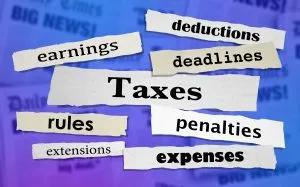
File an Extension for Taxes
Tax season can often feel like a race against time, with the pressure of looming deadlines causing stress and anxiety for many individuals and businesses. However, life is unpredictable, and circumstances can sometimes prevent you from completing your tax return by the designated due date.
The good news is that the Internal Revenue Service (IRS) offers an option to file for a tax extension, giving you an additional 6 months to organize your financial records and prepare an accurate return. In this comprehensive guide, we'll delve into the ins and outs of how to file an extension for taxes including when, why, and how to do so.
Understanding Tax Extensions
A tax extension provides taxpayers with additional time beyond the original filing deadline to submit their tax return. It's essential to recognize that an extension applies only to the paperwork, not to the payment of taxes owed. If you anticipate owing taxes, it's crucial to make an estimated payment by the original tax deadline, typically April 15th, to avoid potential penalties and interest.
Why File a Tax Extension?
While filing an extension may seem like an excuse for people who are too lazy to do their taxes, there are actually a few very good reasons to file a tax extension.
- Unforeseen Circumstances: Life is full of unexpected events, and sometimes they can impact your ability to complete your tax return on time. These could include personal emergencies, health issues, or unexpected work demands.
- Complex Financial Situations: Individuals with intricate financial portfolios, business owners, or those involved in various investments may require extra time to ensure that all income and deductions are accurately reported.
- Gathering Accurate Information: Rushing through your tax return may lead to errors or omissions. Filing an extension allows you the necessary time to gather all required documentation and minimize mistakes.
When to File a Tax Extension
The tax extension deadline typically aligns with the original tax return due date. For individual taxpayers, this means the annual filing deadline, which is usually April 15th. However, due to weekends and holidays, the actual deadline may vary slightly from year to year. To ensure you have the correct date, it's advisable to consult the official IRS website or a tax professional.

How to File a Tax Extension
- Online Filing: The most straightforward and convenient way to request a tax extension is online. You can use a site like IRSExtension.online (which is an IRS-approved e-file provider) to quickly submit your extension request electronically. This method provides an almost immediate acknowledgment of your request.
- Paper Filing: If you prefer a traditional approach, you can use our template to help prepare and mail Form 4868 to the appropriate IRS address. Keep in mind that using the paper method may take longer to process, and you won't receive immediate confirmation.
Filing for a Business Tax Extension
If you're a business owner, the process for filing a tax extension differs slightly. Generally, corporations need to file Form 7004, Application for Automatic Extension of Time To File Certain Business Income Tax, Information, and Other Returns to request a 6-month extension to file business taxes.
Important Considerations
While filing for an extension is great for getting additional time to file your taxes, there are some important considerations to ensure that you don't incur any unnecessary penalties.
- Estimated Tax Payments: While filing for an extension grants you extra time to complete your return, it does not extend the deadline for paying taxes owed. If you anticipate owing taxes, it's crucial to make an estimated payment by the original due date to avoid penalties and interest.
- Penalties and Interest: Failing to file your tax return or pay taxes owed by the designated deadlines can result in penalties and interest. While filing an extension can help avoid the late-filing penalty, it won't prevent the accrual of interest on any unpaid taxes.
- State Taxes: If you're required to file state taxes, remember that state rules may differ from federal guidelines. Some states automatically grant an extension if you've received a federal extension, while others require a separate application.
- Responsibilities and Deadlines: It's important to understand that while a tax extension provides additional time to file your return, you should still aim to complete it as soon as possible, especially if you believe you're due a refund.

Conclusion
Filing a tax extension can provide much-needed breathing room for individuals and businesses facing time constraints or complex financial situations. By understanding the why, when, and how of filing an extension, you can navigate tax season with confidence and ensure that your tax return is accurate and complete.
Remember that while an extension gives you extra time to file, it does not extend the deadline for paying taxes owed, so make sure to estimate and pay your taxes by the original due date to avoid unnecessary penalties and interest. If you find yourself in need of more time, get started filing your tax extension today!
See what some of the hundreds of thousands of satisifed customers have to say about our services:
VERY FAST
I got approved within a couple days for my tax extension filing through these guys and they responded to my email the same day. Great customer service and fast results. Give them a shot.
Great Service!!
This is the second year that I used this service. Each time, the process was quick, easy and efficient. I will definitely be using this service in the future and will recommend it to friends and family.
Fantastic Site!!
The process was so easy. I processed this extension in a matter of minutes! For you last minute filers out there, come here. It'll help you end your long day in peace!



